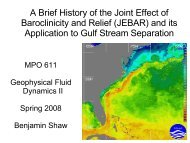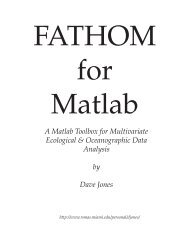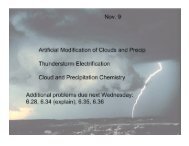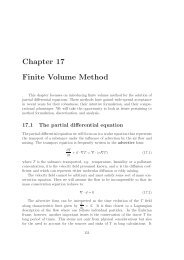2007 (PDF) - Rosenstiel School of Marine and Atmospheric Science ...
2007 (PDF) - Rosenstiel School of Marine and Atmospheric Science ...
2007 (PDF) - Rosenstiel School of Marine and Atmospheric Science ...
Create successful ePaper yourself
Turn your PDF publications into a flip-book with our unique Google optimized e-Paper software.
Dean’s Message<br />
Since its inception in the 1940’s, <strong>Rosenstiel</strong><br />
<strong>School</strong> scientists have been fascinated by<br />
Earth’s ability to adapt to change, time<br />
<strong>and</strong> time again. Be it shifts in marine<br />
biodiversity in the aftermath <strong>of</strong> a hurricane,<br />
the formation <strong>of</strong> new l<strong>and</strong>scapes following<br />
an earthquake or volcanic eruption, or<br />
the evolution <strong>of</strong> a species over millions <strong>of</strong><br />
years, our planet has always found a way<br />
to mitigate natural stressors through an<br />
unending cycle <strong>of</strong> dynamism. It is this quest<br />
to underst<strong>and</strong> the dynamics <strong>of</strong> our “Blue<br />
Planet” that has fueled the growth <strong>of</strong> the <strong>Rosenstiel</strong> <strong>School</strong>, <strong>and</strong><br />
continues to propel us today.<br />
Underst<strong>and</strong>ing The Planet<br />
Our scientists <strong>and</strong> students are intent on deciphering the systems<br />
<strong>and</strong> processes that impact our planet. In an effort to improve lives<br />
<strong>and</strong> build a sustainable future for generations to come, our 100<br />
talented faculty members, 141 research staff, <strong>and</strong> 183 graduate<br />
students are breaking new ground each day in hopes <strong>of</strong> unlocking<br />
some <strong>of</strong> Earth’s long kept secrets.<br />
Proven track records <strong>and</strong> innovative scientific studies make<br />
<strong>Rosenstiel</strong> faculty members extremely competitive in the peerreviewed<br />
grants environment. They receive approximately half <strong>of</strong><br />
the grants for which they apply, which is an impressive 20 percent<br />
above the national average. Within the last five years our researchers<br />
have garnered grants from the National Oceanic <strong>and</strong> <strong>Atmospheric</strong><br />
Administration (NOAA), the National Aeronautics <strong>and</strong> Space<br />
Administration (NASA), the National Institutes <strong>of</strong> Health (NIH),<br />
<strong>and</strong> the U.S. Department <strong>of</strong> Defense (DoD), among others. In<br />
fact, their efforts have consistently placed the <strong>Rosenstiel</strong> <strong>School</strong><br />
among the Top 10 National <strong>Science</strong> Foundation/Geosciences<br />
(NSF/GEO) funded institutions in the nation.<br />
It’s no wonder that our interdisciplinary approach to research<br />
<strong>and</strong> education attracts some <strong>of</strong> the best marine <strong>and</strong> atmospheric<br />
science students from around the world. In <strong>2007</strong>, applications for<br />
graduate admission to the <strong>Rosenstiel</strong> <strong>School</strong> increased six percent,<br />
a testament to the quality <strong>of</strong> our programs, as well as the relevance<br />
our research has in today’s society.<br />
<strong>Rosenstiel</strong> <strong>School</strong> graduate students are frequently the recipients <strong>of</strong><br />
coveted awards <strong>and</strong> fellowships in scientific research. While at the<br />
<strong>School</strong> they conduct important studies <strong>and</strong> participate in valuable<br />
fieldwork in marine <strong>and</strong> freshwater environments around the globe.<br />
In <strong>2007</strong>, the <strong>Rosenstiel</strong> <strong>School</strong> conferred a total <strong>of</strong> 47 degrees,<br />
which is about 24 percent higher than our ten-year average number<br />
<strong>of</strong> students per class over the last ten years.<br />
The University <strong>of</strong> Miami enrolled an unprecedented 290<br />
undergraduate students in <strong>Marine</strong> <strong>Science</strong>, <strong>Marine</strong> Affairs <strong>and</strong><br />
Meteorology in fall <strong>2007</strong>. In a precedent-setting move, University<br />
<strong>of</strong> Miami President Donna E. Shalala approved the transfer <strong>of</strong> the<br />
undergraduate marine science program from the College <strong>of</strong> Arts<br />
<strong>and</strong> <strong>Science</strong>s to the <strong>Rosenstiel</strong> <strong>School</strong>, effective fall 2008. The shift<br />
is part <strong>of</strong> an effort to provide greater access to the <strong>School</strong>’s graduate<br />
<strong>and</strong> pr<strong>of</strong>essional level scientific research earlier in a student’s<br />
academic career <strong>and</strong> to <strong>of</strong>fer students a bachelor’s degree conferred<br />
by one <strong>of</strong> the nation’s top-rated marine schools.<br />
Forming Forecasts & Policy<br />
As one <strong>of</strong> the premier institutions for research into hurricane<br />
development <strong>and</strong> intensification, as well as the study <strong>of</strong><br />
atmospheric dynamics, our work is inherently linked to national<br />
policy. Through our sophisticated modeling, <strong>and</strong> the images<br />
acquired by our state-<strong>of</strong>-the-art Center for Southeastern Tropical<br />
Advanced Remote Sensing (CSTARS), we are supplying important<br />
decision-support information to government agencies, <strong>and</strong> helping<br />
to inform policies that can safeguard human life.<br />
Throughout this Annual Report we highlight several <strong>of</strong> the<br />
collaborations the <strong>School</strong> has established with government entities,<br />
non-pr<strong>of</strong>it organizations, private <strong>and</strong> public agencies, <strong>and</strong> other<br />
academic institutions. Sponsored funding in <strong>2007</strong> reached $47.9<br />
million, an increase <strong>of</strong> 3.7 percent over the previous year, despite an<br />
extremely competitive funding environment.<br />
The University <strong>of</strong> Miami is making tremendous strides in enriching<br />
its research capabilities. Our scientists are actively engaged in the<br />
University’s newly-announced Center for Computational <strong>Science</strong><br />
which will create a valuable high performance computing core, <strong>and</strong><br />
serve as a catalyst to enable greater interdisciplinary collaborations.<br />
This added data capability, when supplemented with the fiber<br />
optic network provided by the Florida LambaRail, will provide<br />
<strong>Rosenstiel</strong> scientists with direct connectivity to numerous domestic<br />
<strong>and</strong> international research networks for the transfer <strong>of</strong> critical<br />
knowledge about planetary processes.<br />
The <strong>Rosenstiel</strong> <strong>School</strong> is also joining forces with other schools,<br />
colleges <strong>and</strong> divisions within the University <strong>of</strong> Miami to work in<br />
an increasingly multidisciplinary manner. This approach affords<br />
faculty members <strong>and</strong> students access to broader perspectives<br />
<strong>and</strong> greater creativity in trying to solve today’s most pressing<br />
environmental issues. One sterling example <strong>of</strong> this is the Leonard<br />
<strong>and</strong> Jayne Abess Center for Ecosystem <strong>Science</strong> <strong>and</strong> Policy,<br />
which brings together university-wide resources to help promote<br />
informed policy making, <strong>and</strong> supports science-based environmental<br />
management for the future.<br />
Sharing The Knowledge<br />
With nearly 60 percent <strong>of</strong> the world’s populations living within<br />
75 miles <strong>of</strong> a coastal area, underst<strong>and</strong>ing the interactions between<br />
communities <strong>and</strong> the ocean has never been more important. The<br />
<strong>Rosenstiel</strong> <strong>School</strong> has an active outreach program that provides<br />
local students, teachers <strong>and</strong> members <strong>of</strong> the community with<br />
the latest information to help them become more aware <strong>of</strong> their<br />
natural surroundings. Programs range from our popular Sea<br />
Secrets lecture series, which this year exp<strong>and</strong>ed beyond Miami to<br />
Naples, to campus tours for high school students, participation in<br />
community-based events, <strong>and</strong> a wide variety <strong>of</strong> scientific training<br />
sessions for youth <strong>and</strong> teachers.<br />
Over the next several decades, the <strong>School</strong>’s work will be essential<br />
to improving how well we can forecast future states <strong>of</strong> the Earth<br />
system, as well as observe it <strong>and</strong> validate the underlying models<br />
that are currently in place. Regardless <strong>of</strong> whether these models are<br />
physical, biological, chemical, or biogeochemical in origin, they are<br />
the cornerstones <strong>of</strong> the sensible policy <strong>and</strong> management approaches<br />
that will affect future generations.<br />
Our distinguished faculty, highly-regarded researchers <strong>and</strong><br />
exceptional students are poised to tackle the emerging<br />
environmental issues that affect our lives. Their ongoing research,<br />
aided by the latest tools <strong>and</strong> technologies, will become increasingly<br />
imbedded in Earth system models <strong>and</strong> help to improve our<br />
underst<strong>and</strong>ing <strong>of</strong> this dynamic planet.<br />
Sincerely,<br />
Otis B. Brown, Ph.D.<br />
Dean<br />
University <strong>of</strong> Miami<br />
<strong>Rosenstiel</strong> <strong>School</strong> <strong>of</strong> <strong>Marine</strong> <strong>and</strong> <strong>Atmospheric</strong> <strong>Science</strong><br />
“The truth <strong>of</strong> the matter is that this field <strong>of</strong> science is inextricably linked to our daily life <strong>and</strong><br />
that <strong>of</strong> future generations. Climate variability <strong>and</strong> natural disasters are taking a significant toll<br />
on our economy, our environment, <strong>and</strong> our well-being. And that is why we must sustain the Earth<br />
observations that underpin national preparedness <strong>and</strong> response.”<br />
- Otis B. Brown, Ph.D., testifying before The U.S. Senate Committee on Commerce, <strong>Science</strong>, <strong>and</strong><br />
Transportation, Space, Aeronautics, <strong>and</strong> Related <strong>Science</strong>s Subcommittee on March 7, <strong>2007</strong>.<br />
i<br />
Photo credit: NASA<br />
ii


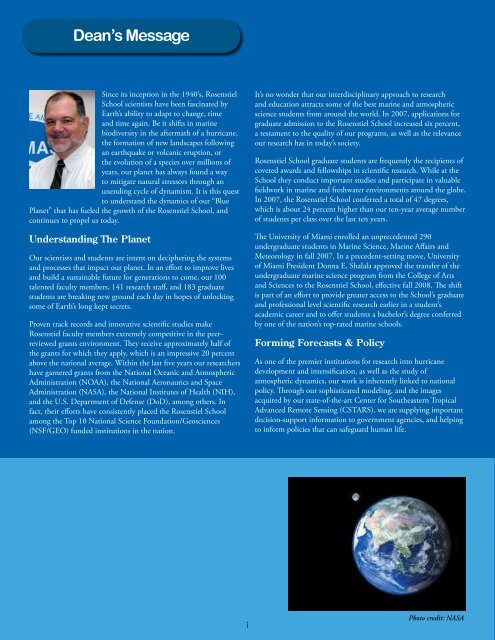
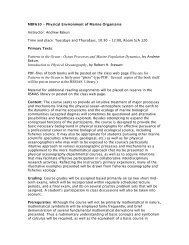
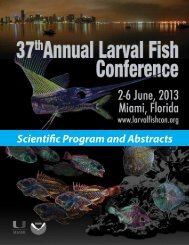
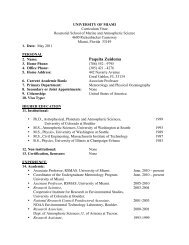
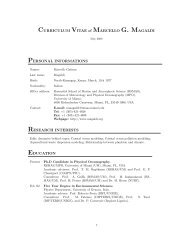
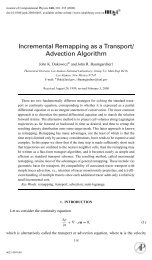
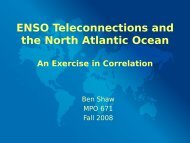
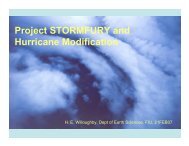
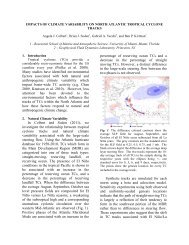

![Wavelength [μm] ZENITH ATMOSPHERIC TRANSMITTANCE](https://img.yumpu.com/26864082/1/190x143/wavelength-i-1-4-m-zenith-atmospheric-transmittance.jpg?quality=85)
